Charity location
Focus
Grant size
Voices in Exile is a small charity based in Brighton that provides legal and practical support to refugees and asylum seekers.
We interviewed Mel Steel, Director, and Alison Kelly, Head of Services, who shared more about the challenges facing the people they work with and how the Foundation’s support has helped the charity continue and strengthen their vital services.
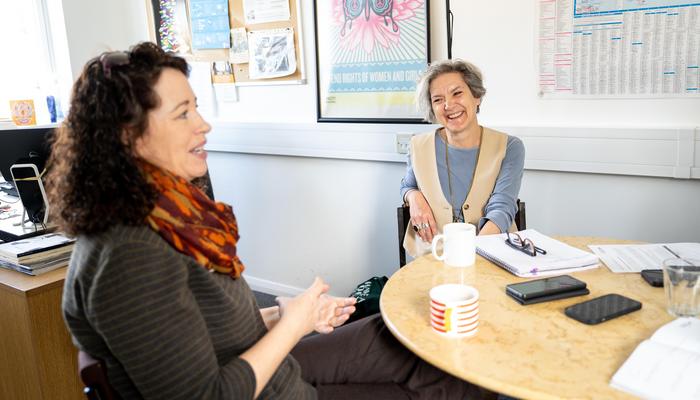
Mel Steel, Director of Voices in Exile (right), with Alison Kelly, Head of Services
Can you share a little about Voices in Exile and what you do?
Mel: Voices in Exile started in 2005 as a grassroots volunteer-led organisation that was set up because there was no central place or space to support asylum seekers and migrants in the city.
Brighton and Hove was an asylum dispersal area, which meant the Home Office sent people who had arrived to be accommodated in the city. Voices provided a safe space where people could meet, get practical advice and be signposted to Legal Aid advice providers.
Legal aid cuts over the years meant that there was less and less legal advice available, so Voices became accredited to deliver immigration advice in 2011. In 2015, the government announced the launch of a resettlement programme, at the time specifically for Syrian refugees, and Brighton and Hove Council committed to resettling a certain number of refugee families. Since then, the council has given us the contract to do the casework for those in the resettlement programme. We also work with asylum seekers and people without any status at all, who have got no recourse to public funds.
Alison: We run a food bank and we provide food and toiletries to families and individuals on a weekly basis. We also run three orientation and support groups a week. Our group facilitator has lived experience of migration and she's also trained in teaching English as a second language. The groups provide a space to practice English and navigate the city, provide support with accessing digital services, employment support and opportunities to meet others and build communities.
Mel: Our core service is still immigration advice. The group work that we're doing supports the skills and strengths and interests that people bring with them. But the work that's needs-based – people needing advice, those who are hungry and homeless and can't get immigration legal advice – that’s our core client group. We’re in an advice desert here, specifically for immigration advice, and that's our USP.
What would you say are the main challenges the refugees and asylum seekers that you work with are facing?
Mel: It's an extremely hostile environment. From the point that people are trying to get into the UK, to trying finally to settle here, almost everything conspires to make their lives as difficult and uncomfortable as possible.
People are living at a level of destitution that most people don’t even have to think about. We're talking about people in asylum hotels living on £8.71 a week. So, they have no money for medicine, for toiletries, food, clothes, etc. And there are children who are suffering from malnutrition living in hotels.
Alison: There's also a lot of trauma. People have arrived with PTSD but then they are being retraumatised because of the environment here and being in limbo for so long. It's very, very difficult to cope.
Refugees and asylum seekers are siloed with no access to support other than from the voluntary sector, which is hugely oversubscribed, and then blamed when they do finally gain refugee status, often after many years living in limbo and destitution, for not being sufficiently integrated into the UK.
We need to start making people feel part of a community, provide them with social networks, start teaching English, start letting people know what their choices and entitlements are, and so on. So, we try to encourage integration at the same time as meeting people's other, more urgent needs.
- Mel Steel, Director, Voices in Exile
How can migrants access immigration advice and how do you support them?
Mel: I would say it's very, very difficult to get legal aid advice. There's only one Legal Aid immigration provider in the city. They are hopelessly over capacity and can hardly take on any new cases. Asylum hotels have been springing up here over the last few years and most of those residents can't access the legal advice that they need.
We're the only free accredited immigration provider and we focus on work that is out of the scope of legal aid. We are OISC-accredited, and we provide specialist free immigration advice. Although we're based in Brighton, the area that we cover is much bigger and people come from all over East and West Sussex and the South East outside London.
Our service includes advising people on asylum claims. We also help people with travel documents and family reunion applications, which is very important for resettled families because a lot of people have been separated from family members, and that makes it very difficult for people properly to settle.
The demand for our services always exceeds our capacity. Which is difficult, because we know that when we turn people away, it's very difficult to find other organisations to take those cases. And the later in the process that someone gets advice, the more unpicking and unravelling it takes to help someone, the more time consuming it is, and also the more likely it is that people will fall prey to unscrupulous advisors or fee-paying advisors. People will sometimes take out loans or get themselves into exploitative situations in order to raise the prohibitive fees charged both by the Home Office and by private solicitors and advisors.
Mohammed’s story
“I came to the UK five years ago after fleeing conflict in my home country of Sudan. Voices in Exile have been supporting me here in Brighton. I go to their English classes and they have helped me with applying for refugee status, getting a job, and helping me to reunite with my wife. I had to leave my wife behind in Sudan and I didn’t see her for more than five years. But she recently got her visa to come to the UK and now she is living here with me.
I volunteer in the food bank at Voices in Exile every week. I enjoy volunteering here because I can help other people in the same way that I have been helped and that makes me happy. Everyone here is so friendly. Anytime I need help - with contacting the council, or the doctor, anything I need, I can talk to anyone here and I know they will help me.”
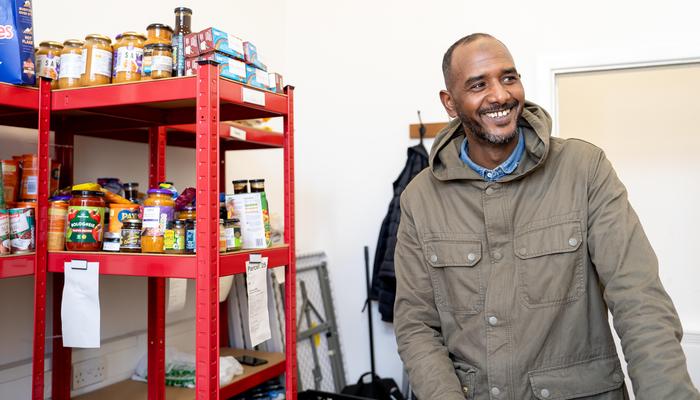
Mohammed at the Voices in Exile food bank
How has the funding from Lloyds Bank Foundation made a difference?
Mel: The funding has gone to support our core services. Even though advice and casework is the core of what we do, it receives almost no dedicated funding. It's incredibly difficult to fund direct advice services, and good advice is expensive. You can do some of it using technology, but mostly people need to see an advisor face-to-face. People need to trust, and need time to feel able to disclose what has happened to them. That's very difficult to do online, because you need to be able to pick up on those nuances.
The funding has essentially enabled us to carry on doing the work that doesn't attract project funding. And this also helps to support the influencing work that we do. The work we do to try and change policy at a local level is based on evidence from our casework and we use case studies and client testimonies to make our arguments.
We’ve had unrestricted funding from Lloyds Bank Foundation which just been brilliant because so often, funding comes with criteria to start something new and innovative, rather than just to be able to continue to provide the crucial and life-saving advice that people need.
- Alison Kelly, Head of Services, Voices in Exile
How are you influencing local policy?
Mel: The council's housing policy is atrocious. People who've been recognised as refugees should be considered as having priority need for social and temporary housing, but the council has decided not to do that and to put as many barriers in the way of providing accommodation for people as possible. We’ve wasted a lot of time, threatening them with legal action and complaining about poor practice and them not carrying out assessments in the way that they should. So that's frustrating, and if we could change something immediately locally, it would be that.
We're going to the council every so often, and we've made some progress, but we just have to keep pushing. The council is also keen to become a Council of Sanctuary, so we've got a little bit of leverage there to challenge them.
Alison: We participate in the City of Sanctuary meetings and assessments. We've also delivered training to Council staff and migrant awareness training, although our capacity for that is quite limited.
What development support have you received from the Foundation?
Alison: The organisational development support offered by the Foundation has been brilliant. We've had support from a fundraiser who helped us to develop our fundraising strategy and has completed a couple of applications to funders for us as well.
Also, a real point of stress was when the resettlement contract with the local authority came up for tender. Since that contract forms quite a large part of our income, it’s been particularly stressful to have to compete for that funding. The Foundation provided us with a consultant, which was so helpful. We had them on hand to reassure us that we were doing the right thing, to read through our application, to keep us on track, and provide invaluable feedback.
Mel: We also had support to develop our theory of change alongside our strategic plan. So it’s all been really helpful.
Alison: As a small charity, we haven't got the infrastructure to be able to pay for these kinds of things or have it done in-house, so it's really brilliant to have this offer of support.
What are the main challenges you’re facing as a charity right now?
Mel: It’s always funding. We don't have any assets. We don't own a building. We haven't got any capital. So, we're constantly fundraising just to pay the wage bill, and that's nerve wracking.
Alison: I suppose the other thing is just the broader political landscape, and austerity and the lack of places to refer people to and the increased need for mental health services and other things. So, it's not just that we are financially fragile, but there's less money to go around in general. There are more people competing for the decreasing funding that's out there.
Mel: The other concern is about staff welfare and retention. It's a really tough sector to work in. So we have to celebrate small wins, we have to look after people, keep an eye on people's welfare and mental health and remind our staff and volunteers that they're not going to be able to make everything better all the time. And that can be quite tough. People do this work out of commitment and passion and wanting to help and it's difficult when you can't.
What are you feeling hopeful about and what opportunities do you see for the future?
Alison: As we’ve mentioned, we’ve been developing our fundraising and comms work – we were always wanting to have regular events and involve the community more and do more fundraising, and we are actually starting to do those things now.
We’ve got a fantastic staff and volunteer team, and we’ve now got volunteers helping with our social media and our website. We actually want someone to provide oversight for our comms so we’ve been in touch with the Foundation to get support with that.
We’re getting more processes in place, we’re getting to the things which always seem to always fall off the to do list because we're dealing with something urgent. I think once they're established, and we're in the habit of doing those things, they'll become routine for us.
Mel: I’ve been here for six and a half years now, and we’ve grown so much, sometimes it feels like building a train when it's moving at high speed – literally laying the track in front of the wheels.
A new government might also change the picture for us, even though we haven’t heard much from any party about providing safe and legal routes. In terms of the next government, I would just love to hear some brave, creative, humane statements and aspirations about how it could be different.
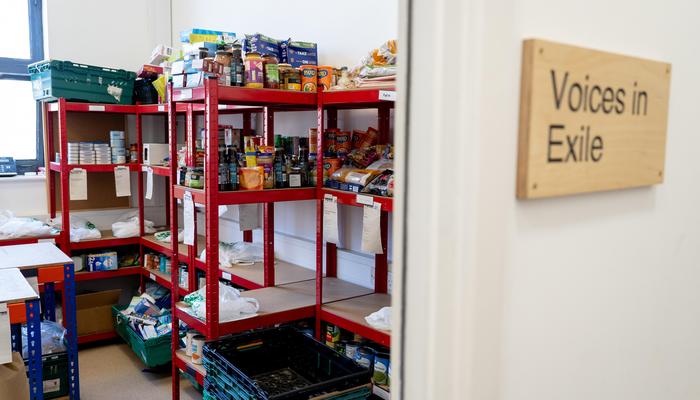
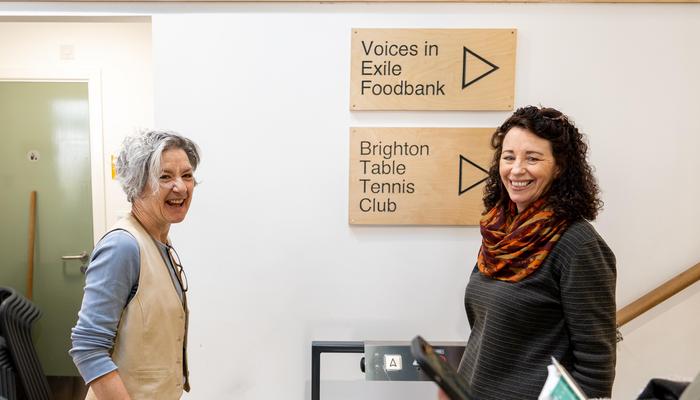
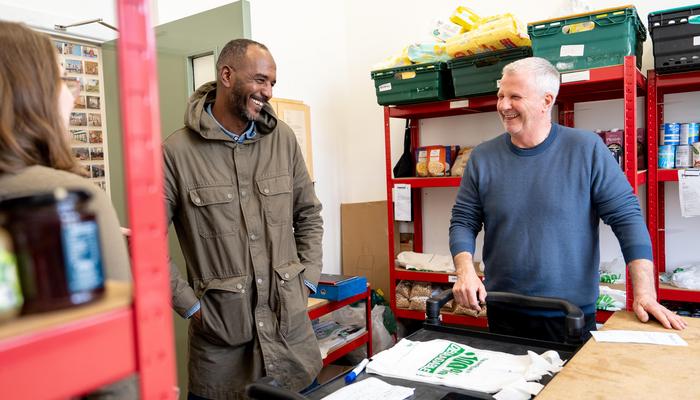
Maha’s story
Maha is a Syrian refugee who was pregnant when referred to Voices in Exile’s support and orientation group from the local migrant English project. She was escaping an abusive relationship, in hiding from her previous partner in temporary accommodation, had no income, and her asylum application was linked to that of her former fiancé.
Voices in Exile provided Maha with comprehensive support, including:
- immigration advice, including successfully referring her to a legal aid provider
- helping her to apply for Section 95 financial support and submit all relevant documents
- successfully advocating for Maha to be accommodated in Brighton
- providing supermarket and fuel vouchers
- providing extensive liaison with Room for Refugees hosts, resulting in long-term secure and suitable accommodation
- supporting referrals to access local services and activities and resources, including baby clothes, furniture and supplies
- improving her social networks and connections to the city
- helping her improve her conversational English
“Voices in Exile has helped with every little thing and every big thing; everything in my life is better now thanks to all of you,” says Maha.
Find out more about Voices in Exile by visiting their website: voicesinexile.org





